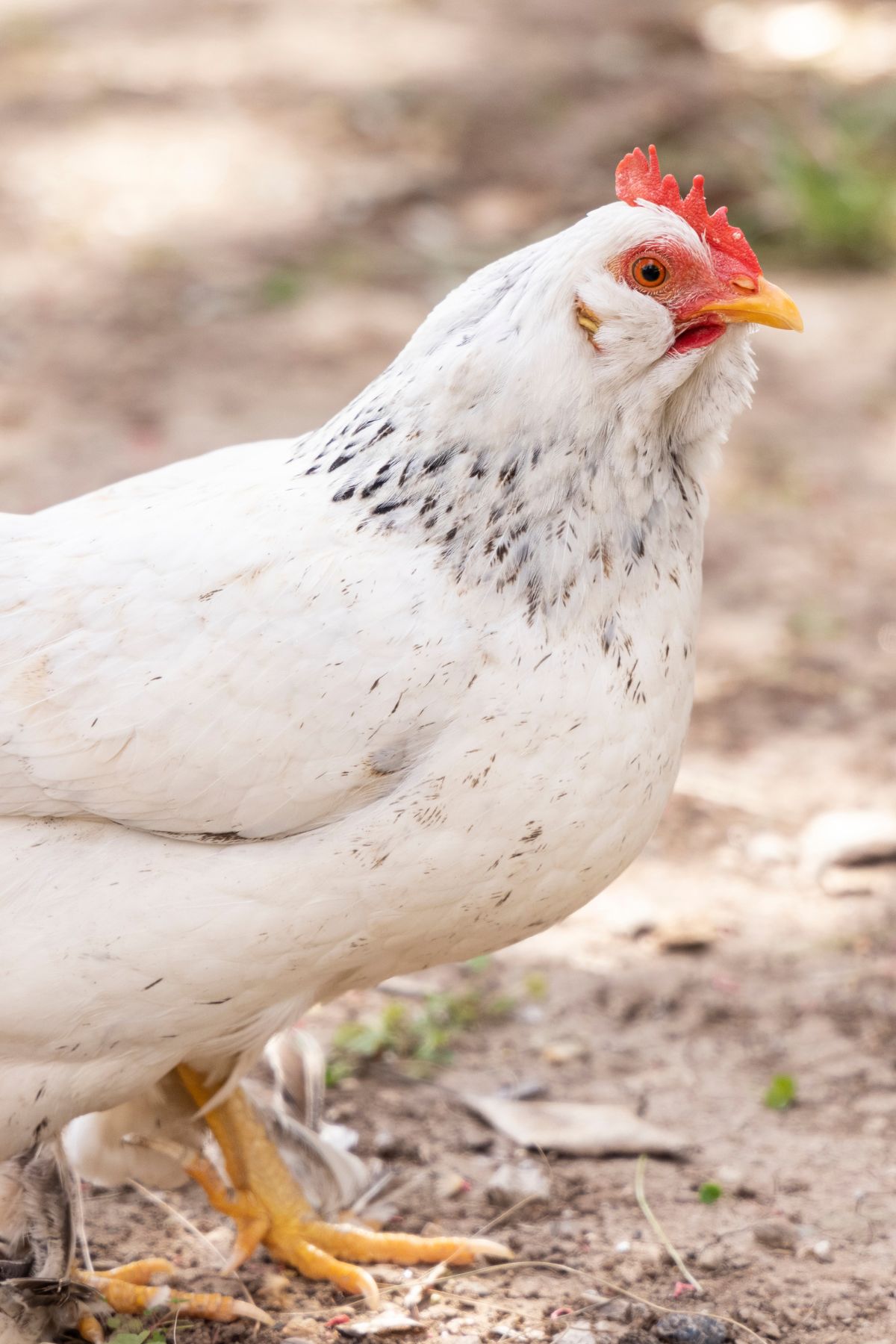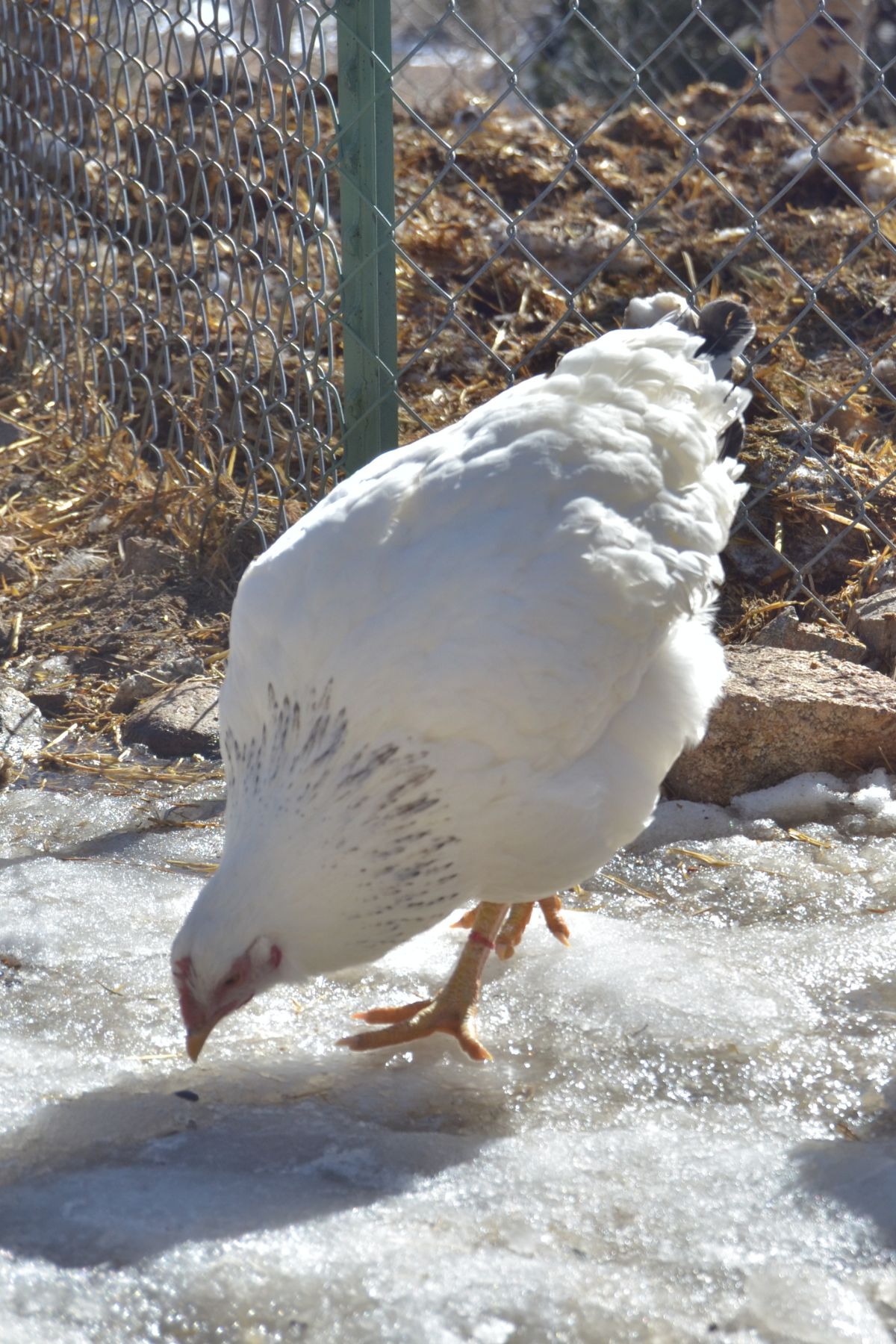Meet the Delaware Chicken: Backyard Breed Guide
Are you considering adding some feathery friends to your backyard? Look no further than Delaware chickens! These unique birds are more than just eye-catching; they’re known for their friendly temperament and excellent egg-laying abilities.
In this comprehensive guide, we’ll dive into everything you need to know about this backyard chicken breed, from their history to care tips.
Let’s discover why many backyard homesteaders, consider them a top pick for a well-rounded flock.

Delawares are a calm and friendly breed that lay a steady supply of very large brown eggs.
They are also a respectable meat chicken.
Delawares at a Glance

Eggs
Very large to jumbo brown eggs. Some of the biggest eggs around, about 4-5 per week.

Appearance
Beautiful mostly white birds with black accents.

Dual PurpOse
Delawares grow quickly and grow large, making them decent meat birds.

Personality
They are friendly with people and do well in a mixed flock.
History of the Breed
The Delaware Chicken breed has an all-American origin story, emerging in the United States in the 1940s. Interestingly, it was first developed in the state of Delaware, which is how the breed got its name.
The breed came to be as poultry farmers crossed Barred Plymouth Rock hens with New Hampshire males.
Originally, they gained popularity for their meat production qualities, offering an early maturity rate and respectable size for meat yield.
However, the Cornish Cross later emerged as the top chicken for meat. But you’ll see that the Delaware should still be a part of your flock, even if you have no intention of raising meat birds.
Egg Production
These hens have lay approximately 200 to 275 large brown eggs per year. That translates to about 4 to 5 eggs per week from each hen.
The eggs themselves are generally very large and brown in color, some of the largest you will find. Their size is also an advantage when cooking, providing a generous amount of white and yolk.

While they might not keep up with the most productive egg-laying breeds, their steady and dependable output means you’ll have eggs nearly year-round: they are exceptional winter layers.
What can you expect from Delaware Chicken eggs? In terms of quality, these eggs are top-notch. The shells are usually quite strong, which means less breakage and waste.
Appearance, Size, and Lifespan
Delaware Chickens have a distinct identity that makes them easily recognizable even to the untrained eye. Starting with their plumage, these birds are primarily white but come with a striking touch of black barring on their neck and tail feathers.
Identifying a Delaware is usually straightforward due to their unique feather pattern and coloration. The white body with black markings on the neck and tail is a dead giveaway, making it easy for even beginners to spot a Delaware in a mixed flock.

As for size, Delaware Chickens are generally considered medium to large birds. Adult males typically weigh around 8.5 pounds, while females usually weigh around 6.5 pounds.
When it comes to lifespan, you can expect a Delaware Chicken to live between 6 to 8 years, assuming they are given proper care and living conditions. (This is fairly standard among backyard chicken breeds.)
Personality
These birds are often described as friendly, docile, and incredibly sociable. They tend to get along well with humans, often enjoying pats and even cuddles from their owners. Many Delaware Chicken owners have noted that their birds will often come running when they see familiar faces, hoping for treats or simply some attention.
In our flock, they don’t mind being picked up and are calm and very gentle with kids.
But it’s not just humans they’re good with; Delaware Chickens are generally congenial around other animals as well. Whether you have other chickens, ducks, or even dogs and cats, Delawares are usually adaptable and non-aggressive. Their peaceful temperament makes them less likely to bully other birds in a mixed flock, which is particularly useful if you’re considering integrating them with other breeds.
Since Delawares are generally not aggressive, you should find that they integrate relatively smoothly, assuming your existing flock is also of a non-aggressive nature.
Delaware Chickens for Meat
One of the standout features of Delaware Chickens is their suitability as a dual-purpose breed, excelling in both egg and meat production. When it comes to meat yield, these birds offer a generous output. Adult males typically weigh around 8.5 pounds, and females usually weigh in at about 6.5 pounds. Their flesh is tender and flavorful, making them a favorite for those who are interested in home-grown poultry meat. Their early maturity also means you won’t have to wait long to benefit from their meat-producing capabilities.
How do Delaware Chickens compare to other meat breeds? While they might not have the sheer bulk of some specialized meat breeds like Cornish Cross, they hold their own quite well, especially considering their dual-purpose nature. They provide a good balance of meat yield without sacrificing egg production, something that can’t be said for all meat-focused breeds.
Caring for Delaware Chickens
Delawares are cared for like any other backyard chicken; they have no special needs and are generally quite healthy and happy birds.
Diet and Nutrition: Feeding Your Delawares
For optimum egg production and overall well-being, a balanced poultry feed that’s high in protein is often recommended. Many chicken keepers opt for layer pellets or crumbles that contain around 16-18% protein. Calcium supplements like crushed oyster shells can also be provided to help strengthen eggshells.
While it may be tempting to spoil your Delawares with treats, these should make up no more than 10% of their diet to ensure they’re getting the nutrients they need from their primary feed.
Housing and Space Requirements: Room to Roost
Delaware Chickens appreciate ample space to roam and explore. An ideal coop for these birds would offer at least 2-3 square feet of space per bird, while the attached run should offer at least 8-10 square feet per bird. Adequate roosting bars and nesting boxes are also important to keep your flock comfortable and productive.
Creating a Delaware-friendly environment goes beyond just space; consider adding dust baths for natural mite control and offering shaded areas for hot days. A variety of perches and possibly even a swing can keep these intelligent birds engaged and happy.
Common Health Issues and Solutions: Keeping Your Flock Fit
Delaware Chickens are generally hardy birds, but like all poultry, they’re susceptible to certain health issues. Common diseases to look out for include respiratory infections, mites, and lice, as well as internal parasites like worms. Prevention is always better than cure, so maintaining a clean coop, providing fresh water, and implementing regular health checks can go a long way in keeping your flock healthy.
For more help choosing chicken breeds:
- Chickens That Lay Green Eggs
- Chickens That Lay Brown Eggs
- Chickens That Lay Blue Eggs
- Backyard Chicken Keeping for Beginners
Is the Delaware Chicken Right for Your Backyard?
When it comes to finding the perfect chicken breed for your backyard, Delaware Chickens offer a compelling blend of characteristics that make them a standout choice. Known for their dual-purpose capabilities, these birds excel in both egg and meat production. Their reliable laying habits, yielding around 200 to 275 large brown eggs per year, make them a dependable source for your breakfast table. On the meat front, they offer a generous yield of tender, flavorful flesh that stands up well even when compared to specialized meat breeds.

But it’s not just their productivity that makes them a top pick; their friendly, sociable nature adds an element of joy to the chicken-keeping experience. They’re easy to integrate into a mixed flock, get along well with humans and other animals, and generally prove to be hardy and adaptable. These qualities make them an excellent choice for both beginners and seasoned poultry keepers.
So, who should consider adding Delaware Chickens to their flock? If you’re looking for a well-rounded, easy-going bird that brings both reliable productivity and a pleasant personality to your backyard, then look no further. Delaware Chickens are ideal for families, those new to chicken-keeping, and even experienced poultry enthusiasts who want a dependable, dual-purpose breed. All things considered, these sweet, productive birds could very well be the perfect addition to your backyard homestead.
Love,










